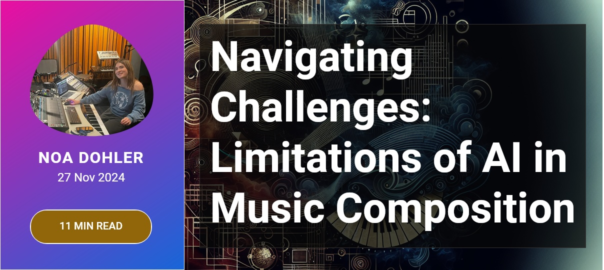AI music generator revolutionizes composition, but at what cost?
The rise of artificial intelligence in music creation has sparked intense debate about the future of composition. From basic melody generators to sophisticated AI systems challenging traditional composition methods, we’re witnessing a transformation that’s both exciting and concerning for musicians worldwide.
Last month, I experimented with an AI music generator for a film score. While it produced technically correct harmonies, it missed the emotional subtleties I wanted. It reminded me that technology, while powerful, can’t replicate the human experience that shapes genuine musical expression.
The Evolution of AI for Music: From Concept to Reality
The journey of AI in music composition began with simple algorithmic experiments and has evolved into sophisticated systems capable of generating complex musical pieces. According to recent market research, the global AI music generation market is expected to reach $3.1 billion by 2028, up from $300 million in 2023, demonstrating exponential growth in this sector. Despite these impressive numbers, AI music generators face fundamental challenges in understanding contextual nuances and emotional depth. These systems excel at pattern recognition and rule-based composition but struggle with the intangible aspects of musical creativity. The technology’s evolution reveals both its potential and limitations, highlighting the complex relationship between artificial intelligence and artistic expression. Modern AI music tools can analyze vast databases of musical compositions, identifying patterns and structures to generate new pieces. However, they often produce music that feels mechanical or derivative, lacking the spontaneity and emotional resonance that characterizes human-created music.
Composing Conundrums: Challenges for an AI Music Generator
Today’s AI music generators face significant hurdles in replicating human creativity. As noted in recent industry analysis, one of the greatest challenges lies in authentically grasping the rich emotions and subtle feelings that give music its soul. While AI can process musical theory and structure with remarkable accuracy, it struggles with innovative composition that breaks established patterns. The technology excels at mimicking existing styles but often falls short when attempting to create truly original works. This limitation stems from AI’s fundamental nature as a pattern recognition system, which constrains its ability to generate genuinely innovative musical ideas. The challenge becomes particularly evident in genres that rely heavily on emotional expression and cultural context. AI systems can analyze and reproduce technical elements but struggle to capture the intangible qualities that make music deeply moving and personally meaningful.
The Artistic Limits and Potential of AI Music Creation
AI music generation tools face a fundamental challenge: the inability to truly understand or replicate human emotional experiences. According to industry experts, AI-generated music can sometimes be indistinguishable from human-created works on a technical level, yet it often lacks the depth and nuanced expression that comes from lived experience. This limitation is particularly evident in compositions requiring subtle emotional shifts or cultural understanding. The technology can process and analyze musical patterns effectively, but struggles to infuse creations with authentic emotional resonance. While AI music generators can produce technically sound compositions, they often miss the mark in creating music that deeply resonates with listeners on an emotional level. This highlights a crucial gap between technical proficiency and artistic authenticity in AI-generated music.
Mubert AI and the Future of Collaborative Composition
Mubert AI represents a significant advancement in collaborative music creation, demonstrating how AI can enhance rather than replace human creativity. The platform’s ability to generate unique, context-aware musical content opens new possibilities for composers and producers. By leveraging sophisticated algorithms, Mubert AI creates customizable soundscapes that serve as starting points for human creativity. This approach to AI-assisted composition represents a middle ground between purely automated and human-created music. The system’s success in generating usable musical elements while leaving room for human input demonstrates a viable path forward for AI in music creation. Rather than attempting to replace human composers, Mubert AI shows how artificial intelligence can serve as a powerful tool in the creative process, augmenting rather than supplanting human creativity.
Innovating the Future: AI Music Business Opportunities
Emerging opportunities in the AI music space include personalized streaming services that generate music based on real-time user emotions and activities. Companies could develop AI-powered music education platforms that adapt to individual learning styles and progress. Advanced licensing models for AI-generated music could revolutionize content creation for media producers. Startups might focus on creating hybrid composition tools that blend AI capabilities with human input, allowing for unique collaborative experiences. The market potential extends to specialized AI music generation for therapeutic applications, gaming, and interactive entertainment experiences. These innovations could create new revenue streams while addressing current limitations in AI music generation.
Shaping Tomorrow’s Sound
The future of music creation lies not in choosing between AI and human creativity, but in finding innovative ways to combine both. Whether you’re a seasoned composer or an aspiring musician, embracing AI as a collaborative tool while maintaining your unique artistic voice will be crucial. How will you incorporate AI into your musical journey? Share your thoughts and experiences in the comments below.
Essential FAQ about AI Music Generation
Q: Can AI completely replace human musicians?
A: No, AI currently serves best as a complementary tool. While it can generate basic compositions, it lacks the emotional depth and cultural understanding that human musicians bring to music creation.
Q: How accurate is AI-generated music?
A: AI can create technically correct compositions following musical rules, but often struggles with originality and emotional expression. The technology is about 85% accurate in replicating basic musical patterns.
Q: Is AI-generated music copyright-free?
A: No, AI-generated music often involves complex copyright considerations. The legal framework is still evolving, with different platforms having varying terms of use and licensing requirements.
